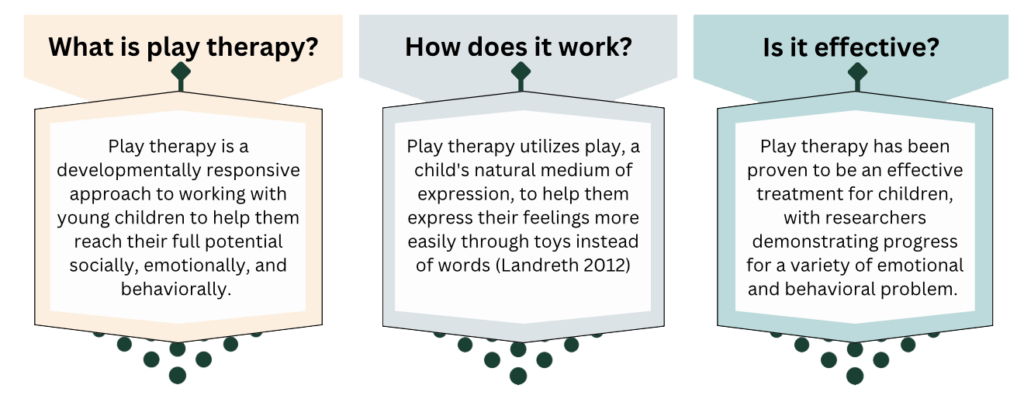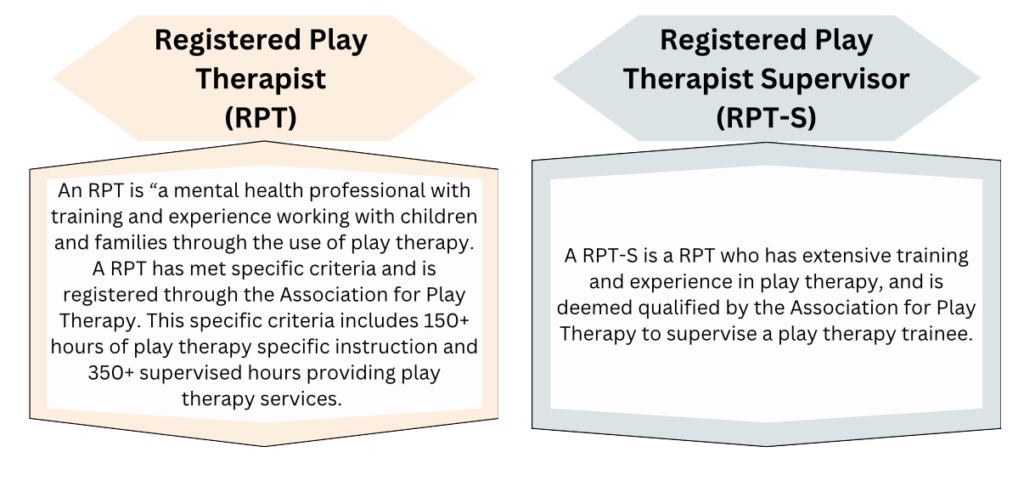By: Elizabeth (Liz) Ener, PhD, LPC-S, RPT-S
Choosing a therapist for ourselves, let alone children, can be an overwhelming process. As parents you want to choose the best option available to work with your children and navigating the plethora of options can feel like such a rollercoaster (and not always the fun ones). The anxiety that such a process causes can leave you feeling flooded and unsure how to make such an important decision. When exploring therapy options for children, you will come across the treatment approach of play therapy quite a bit.
Consider the following for a brief explanation regarding play therapy :

Because therapy is both a financial and time investment, asking your play therapist some specific questions can help to ensure competency and a goodness of fit. You will find some questions and considerations below to ask prospective counselors to help guide your process in selecting the best play therapist to work with your child and your family.
Q: How and where were you trained to do counseling?
The quality of training a child therapist receives directly informs their skills and proficiency. Not all training programs are created equal—so you want to make sure to ask your child’s therapist about their training experiences. Start by first asking where they received their clinical degree; you may want to inquire whether their program was accredited—there is a bit controversy in the therapy field regarding whether programs should be accredited, but what accreditation serves to do is ensure that minimum competency standards have been met. Locally, some great programs that provide quality child therapy training include the University of North Texas (UNT) and Southern Methodist University (SMU).
Q: How was your supervision experience specific to your work with children and play therapy?
Well-trained play therapists are observed and evaluated in working directly with child clients by seasoned supervisors—shockingly, there are many therapists who have never had their clinical work observed and/or had supervisors who were underwhelming across all specialty areas (not just play therapy). On that note, in regards to play therapy, you want to be familiar with a couple of credentials:

Ask your child’s play therapist about their supervision experience—you want to ensure it was provided (or is being provided) by a Registered Play Therapy Supervisor (RPT-S); and you want to ensure that this supervision experience included regular direct observation of their play therapy services (that is, their supervisor watched, either live or video recording, them providing play therapy services and provided regular, on-going feedback and instruction to strengthen skills and their overall quality of services). Research continues to support that direct observation and feedback is the most effective supervision method.
Q: What is your theoretical model of change?
You want your child’s play therapist to be able to address how they are going to help your child and your family. One way to inquire about how they are going to help is to ask about their theoretical model of change. Given that there are a multitude of counseling theories, it is not necessarily a specific theory to look for, but rather your play therapist’s ability to articulate and explain to you their theoretical model and how it would be helpful to your child and your family. They should also be able to explain this in a manner that is easy to understand. Some prominent theoretical models of change in the play therapy world include, but are not limited to, Child-Centered Play Therapy and Adlerian Play Therapy, both of which have solid research supporting their effectiveness.
Q: How do you involve parents in the counseling process?
You should have a working relationship with your child’s play therapist in which you meet regularly for parent consultations to receive updates on your child’s progress. Ask about how you will be involved in your child’s therapy and how often you will meet with your child’s play therapist for updates. Generally you should expect to meet with your child’s play therapist every 2-3 sessions, but frequency of parent consultations varies slightly by clinician. While your play therapist will not (and should not) give you a play-by-play of your child’s play behaviors, they should be able to at any given moment articulate their conceptualization for your child’s functioning (history and explanation of problem and roadmap for counseling), provide you short term and long term recommendations, and engage in complex problem-solving. Ultimately if you do not know what is happening in your child’s play therapy process and/or do not regularly meet with your child’s play therapist, then that is a problem.
Q: What play materials should be used?
Play therapy typically happens in a room that is designed specifically for play therapy; the room has a variety of toys that are selected to help kids express and understand their thoughts, feelings, and relationships. The toys and play materials are chosen to facilitate communication around the issues kids can face. Specific to Child Centered Play Therapy, the playroom or play area has three general types of toys—aggressive/acting out toys (e.g. soldiers, dart gun, mask, swords), real life toys (e.g money, costumes, cars trucks, baby dolls, dishes, animals), and creative/emotional expression toys (sand, puppets, clay, scissors, craft stick, markers). As an example, below is a picture of one of our play therapy spaces, which includes fairly standard play therapy items and materials.

Closing
Your child and your family deserve to get the best available therapy possible; a therapy that equips and empowers your child to reach their highest potential. While it can take time and effort to identify the best play therapist for your child and your family, the resulting positive therapeutic experience is worth it. Our hope is that these questions can help alleviate some of the stress in guiding your selection process of choosing a play therapist that is best for your child and family! Above all you want a therapist that both you and your child feel comfortable with, especially considering that the quality of the therapeutic relationship (both between the play therapist and your child and the play therapist and your family) directly correlates to positive therapy outcomes.
References:
While this blog post is centered on play therapy services and choosing the best counselor for your child, our esteemed mentor and colleague, Dr. Dee Ray, wrote an amazing piece that you might find helpful for general questions to consider regardless of age: How to Choose a Therapist: 5 Good Questions
Bratton, S. C., Ray, D., Rhine, T., & Jones, L. (2005). The efficacy of play therapy with children: A meta-analytic review of treatment outcomes. Professional Psychology: Research and Practice, 36, 376 –390. doi:10.1037/0735-7028.36.4.376
Landreth, G. L. (2012). Play therapy: The art of the relationship (3rd ed.). New York, NY: Routledge.
LeBlanc, M., & Ritchie, M. (2001). A meta-analysis of play therapy outcomes. Counseling Psychology Quarterly, 14, 149–163. doi:10.1080/09515070110059142
Lin, Y.W., & Bratton, S.C. (2015). A meta-analytic review of child centered play-therapy approaches. Journal of Counseling and Development, 93, 45-58. DOI: 10.1002/j.1556-6676.2015.00180.x
Ray, D.C., Armstrong, S.A., Balkin, R.S, & Jayne, K.M. (2015). Child-centered play therapy in the schools: Review and meta-analysis. Psychology in the Schools, 52, 107-123.